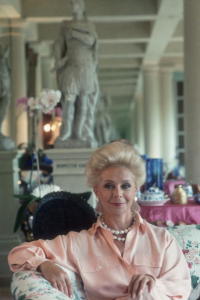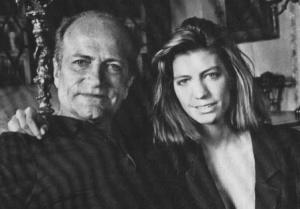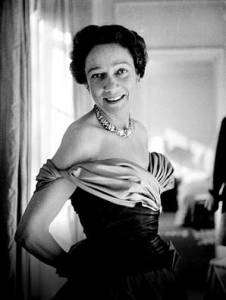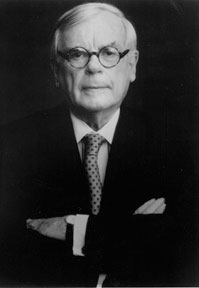
Dominick Dunne
Too Much Money, Too Many Secrets
Random Thoughts on Dominick Dunne and Truman Capote
Dominick Dunne’s last novel Too Much Money probably deserves a brief mention on my Facebook page. Something like, “If you follow the lives of Brooke Astor, Lily Safra, Barbara Walters, Liz Smith, Conrad Black, Gary Condit, and the von Bulows, and need an airplane or beach novel, this quick read will do the trick.”
But I kept thinking about Dunne, even though this wafer of a novel probably doesn’t bear too much examination. I read about similarities between Dominick Dunne and Truman Capote, one of my favorite writers, when I was young. (At 14, I stole a book of Capote’s short stories from the school library. They never missed it.) Both writers covered low acts in high society and craved celebrity. Capote went on about the nonfiction novel, and Dunne just called his books novels. Capote spent his last years doing very little writing, addicted to drugs and alcohol and appearing incoherent in public. Although Dunne was sober, clear, and productive, he was in the closet. Dunne probably wanted the literary attention that Capote received early in his career. And while Dunne outsold his writer family, brother John Gregory Dunne and sister-in-law Joan Didion, he never entered the pantheon of literature. At the same time, he didn’t seem bitter. He was inside the fish bowl and yet always remained an outsider. His residences, full of traditional expensive fabrics, make a nod to his society connections, but are like miniature replicas.

Dunne’s terrace on Manhattan’s Upper East Side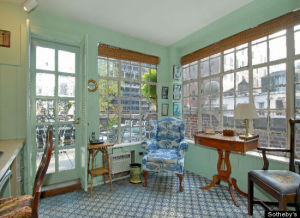
The study where he wrote
Capote’s swans rejected him after Answered Prayers, but Dunne kept moving in the world he wrote about despite the occasional snub. Not that he didn’t have enemies, like the Kennedys, the Safras, and most famously Congressman Condit. And while he got careless with facts, as Capote did from time to time, most folks knew he was telling a larger truth. When you get to the top, there ain’t much there. This is the deeper secret Capote didn’t see.
A few months ago, we rented the documentary After the Party, which chronicled Dunne’s story. Listen to him talk—he was so obviously gay. Earlier in his career, he was a television and film producer and was the executive producer of the film Boys in the Band. Maybe all those campy queens spoke a truth to him but also frightened him deeper into the closet. The documentary and his nonfiction writings make it clear that he cared deeply about his children and his former wife. These days it’s easy to dismiss a man torn like that—“Oh, he just got married to cover up,” etc. But I don’t think it is so simple. Sexuality is not so simple. In a clever move, Dunne used his last novel to come out when his main character/alter ego Gus Bailey reveals he is gay.
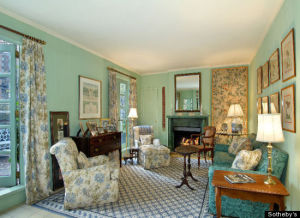
The living room where he entertained very little
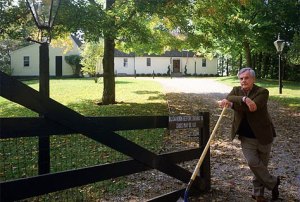
An old photo of Dunne at his country house in Connecticut
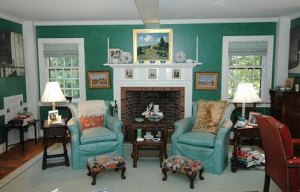
The living room in Connecticut
Little is known publically about Dunne and his sexuality. In his interview with George Stephanopolous, Dominick’s son, Griffin Dunne, uses the words gay and bisexual to describe his father. A few months before his death, Dominick told the London Times that he was a “celibate closeted bisexual.” As I have written before, I think the term bisexual honestly expresses the human condition. I think you are born with an orientation and as you grow up and meet people, you move back and forth along the continuum. What is tragic is when somebody has to deceive and experience shame for most of their life. We all deceive, and the truth is slippery. But to live in constant deception and shame distorts your life. And yet Capote, who was out of the closet most of his life, seemed full of self-loathing and led, at least for his last years, a miserable existence. Dunne, who speaks about his father mistreating him as a child for being a sissy, stayed in the closet his entire adult life. After success in Hollywood, he too became addicted to drugs and alcohol, but then found sobriety. He lived a life that he was drawn to and repelled by at the same time. In both cases, the shame of sexuality, revealed or not, propelled the men into a furious chase for recognition.
If their families and society in general had been accepting of unorthodox sexuality, might these two have never become successful writers? Was it the outsiderness that made them? I am betting on a life with too little money and fewer secrets.
